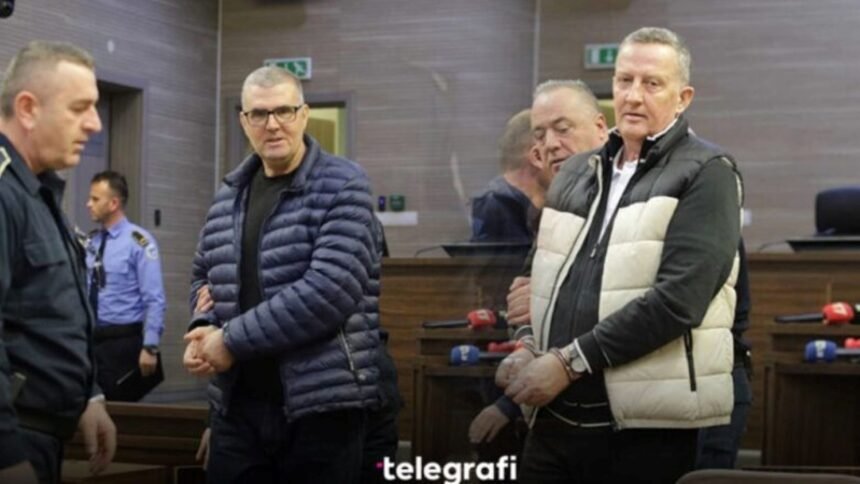The Basic Court in Prishtina, Special Department, has upheld the indictment filed by the Special Prosecution of the Republic of Kosovo (PSRK) against Muharrem Qerimi and Bedri Shabani on charges of espionage. Qerimi also faces an additional charge of unauthorized possession of weapons.
The court’s decision rejected the objections to evidence and requests for the dismissal of the indictment submitted by the defense lawyers of the accused, Besnik Berisha for Shabani and Betim Shala for Qerimi, against the PSRK indictment dated February 19, 2025.
Shabani’s defense lawyer, Besnik Berisha, had argued that the evidence listed in the indictment was obtained unlawfully, claiming that the order issued by the Supreme Court of Kosovo did not specify the subjects of surveillance and lacked sufficient reasoning. Berisha also contended that there was no proof linking Shabani to the phone and device seized, and that the warrants issued by the Basic Court did not meet the legal standard of reasonable suspicion. Furthermore, Shabani’s media statements should be inadmissible, according to Berisha, as they contained no elements connecting Shabani to the alleged crimes. Berisha also stated that the PSRK had not provided any evidence to support the claim that Srdjan Rosiq, with whom Shabani allegedly communicated, was part of the Serbian secret service.
Qerimi’s defense lawyer, Betim Shala, argued that the PSRK had not demonstrated that Qerimi’s actions endangered Kosovo’s legal order and that most of the evidence secured by the prosecution was public. Shala also asserted that the evidence attached to the indictment did not prove the factual situation and that the elements of the criminal offense Qerimi was charged with were not met. Shala claimed that Qerimi’s trip to Serbia to meet with Srgjan Rosiq was for health reasons and that crossing the border did not constitute a criminal offense.
The Prosecution, in its response, proposed that the court reject the defense’s objections and requests as unfounded. The court, based on the parties’ submissions and the Prosecution’s response, concluded that there was well-founded suspicion that the accused had committed the offenses they are charged with.
Regarding Shabani, the court found that telecommunication intercepts with Rosiq indicated the provision of information, documentation, and reports related to the Kosovo Liberation Army (KLA). The court stated that Shabani allegedly provided Rosiq with information about KLA superiors in the village of Mollopolc in Shtime. Examination of Shabani’s phone also revealed materials and photographs that supported the well-founded suspicion that Shabani committed the charged criminal offense. The court noted that police reports from open sources confirmed Rosiq was a Serbian BIA (Security Intelligence Agency) official.
Concerning Qerimi, the court found that border crossings were made for meetings with Serbian BIA officials, a fact allegedly corroborated by witness B6’s testimony. The court stated that material and personal evidence suggested Qerimi collected information on criminal groups, the police, businesses, and other criminal offenses in Kosovo. Shabani also allegedly kept notes on potential witnesses for the Kosovo Specialist Chambers in The Hague and KLA superiors, with numerous entries including Serbian phone numbers and communications with BIA official Rosiq.
The court dismissed Berisha’s claim for the inadmissibility of evidence, stating that the evidence appeared to have been secured through secret investigative measures in accordance with the Criminal Procedure Code. The court also found Berisha’s objections regarding the Supreme Court’s warrant and media-published evidence to be unfounded, stating that sufficient reasons were specified in the warrant and that the media evidence was adequately identified to support the well-founded suspicion at this stage. The court also rejected the claim that there was no proof of Rosiq’s BIA affiliation, stating that the evidence suggested a well-founded suspicion of his involvement, with final verification to occur during the judicial review.
The court granted the right to appeal within ten days upon receipt of the decision by the parties. The hearing on March 5, 2025, was adjourned at Shabani’s request for additional time to review the indictment before declaring his plea.
The PSRK filed the indictment against Bedri Shabani and Muharrem Qerimi on February 19, 2025, accusing them of collecting and sending information and documents to the Serbian BIA regarding the KLA, its superiors and members, the Police, the Kosovo Intelligence Agency, the Police Inspectorate, and specific events and objects, including the Reçak massacre. The PSRK alleges that these actions aimed to incite a broad inter-ethnic conflict in Kosovo, create a false narrative linking the KLA Military Hospital to the “Yellow House” organ trafficking allegations, and cast doubt on the truth of the Reçak massacre. Shabani and Qerimi are charged with espionage, while Qerimi also faces a charge of unauthorized possession of weapons.







